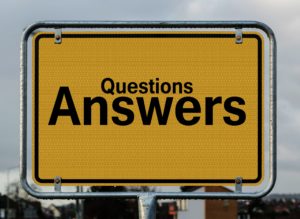Answers and Questions
 Many of you know that one of my leadership lessons over the years has been learning to ask the right questions. Or should I say working to learn to ask the right questions since it is an on-going practice. And learning to ask good questions, let alone the ‘right’ ones is challenging. Years ago, when the ADA was first becoming part of our lives, student reporters would call me. They would introduce themselves, say, “I’d like to talk with you about the ADA.” and then stop. Often after a long pause, I’d prompt them with a response like, “What part of the ADA to you want to discuss?” For an interview, some level of question is required.
Many of you know that one of my leadership lessons over the years has been learning to ask the right questions. Or should I say working to learn to ask the right questions since it is an on-going practice. And learning to ask good questions, let alone the ‘right’ ones is challenging. Years ago, when the ADA was first becoming part of our lives, student reporters would call me. They would introduce themselves, say, “I’d like to talk with you about the ADA.” and then stop. Often after a long pause, I’d prompt them with a response like, “What part of the ADA to you want to discuss?” For an interview, some level of question is required.
They were learning and I coached many a new reporter by insisting that they ask me questions. Most of us learn early on the basic reality one of the routes to learning is a being able and willing to ask questions. With people we learn to ask open-ended rather than closed questions if we want to get to know them. In job interviews, I’ve been asked questions that demanded something more than rote answers. I remember several occasions where I learned something about my own thinking as I sorted out my answer on the spot and left the interview realizing I needed to bring that idea to my current job. The good question opened up my thinking on a topic in a way that my daily experience had not. With problems, we need to ask questions that open up our thinking and options.
In the work done by the Center for Courage and Renewal, they suggest something more than an open-ended question. They challenge participants to ask “honest, open” questions. In this definition, an open question is one that “expands rather than restricts your area of exploration, one that does not pose or even nudge you to a particular way of framing a situation.” An honest question is “one I can ask without possibly being able to say to myself, ‘I know the right answer’”. For example, the question, ‘Have you thought about seeing a therapist’ presupposes this as a solution for the other person. ‘Do you feel anger?” is often a question based on how I might feel in the situation or how I imagine you feel. It is not a question that creates a space for the other person to figure out how they feel.
Some time along the way, I learned the idea that the questions we ask determine the answers we receive. I sort of nodded along with the idea. It made sense, but I couldn’t have given you an example until those years when I was first working with the ADA. I worked with many well-meaning people who were trying to do right by people with disabilities but who were in fact asking very narrow questions. In many ways, they didn’t meet either test – of openness or honesty. They were questions that pre-supposed a sense of order to the world and sought to respond to the question of appropriate accommodations as narrowly as possible. Working with people with disabilities showed me new ways to understand our systems and designs and I learned to ask questions that were more open, that created a broader set of possible answers – different questions – different answers – different options and possibilities. Just like the student reporters, I had to learn to ask questions about processes and systems. And then I had to learn to ask better, more interesting, questions. I had to learn to ask honest questions – ones to which I had no idea of the answer.
Our current situations in the world, on our campuses and in our organizations, even within our families are crying out for new answers. What questions are we asking? Are we asking questions that only allow for narrow answers or questions that open possibilities? Are we willing to ask questions for which we can’t even imagine the answers? It feels like we need good questions more than ever before. We also need the courage to ask questions that aren’t being asked. What questions are you asking?
Take care,
Gage
Quotes from Palmer, P. J. (2004). A Hidden Wholeness: The Journey Toward an Undivided Life. San Francisco: Jossey-Bass
